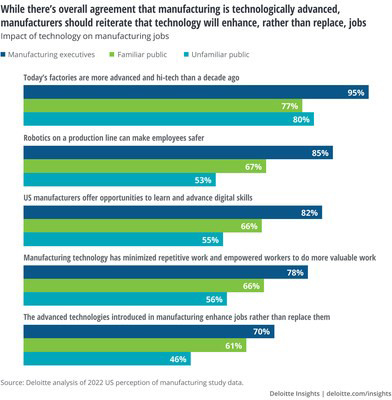Deloitte, an audit, consulting, tax and advisory company headquartered in London, England, and the Manufacturing Institute, Washington, DC, have released findings of a study based on two recent surveys of executives and consumers about US manufacturing. Topics discussed in the surveys include industry perceptions and information about attracting and retaining talent.
According to the surveys, perceptions do not reflect the current level of technological advances, benefits and salary levels in the industry. However, the manufacturing sector should bring public perceptions in line with the current reality of the industry to attract the stable, skilled workforce needed for economic growth and global competitiveness.
These perceptions include:
- Competition with other sectors: The surveys showed manufacturing companies are increasingly competing with other sectors for skilled labor. Manufacturing ranks behind technology, health care, communications, energy and financial services as preferred career options.
- Technology: Two-thirds of consumer respondents see manufacturing jobs as innovative and problem-solving oriented. Manufacturers should reiterate that technology is expected to enhance, rather than replace, jobs. For instance, digitalization, robotics and artificial intelligence can make jobs safer and enable employees to do more productive work.
- COVID-19 impact: The public’s understanding of how crucial manufacturing is for the US economy has increased as a result of the COVID-19 pandemic response, especially given the industry’s designation as essential in producing ventilators and PPE and keeping supply chains rolling.
While 84% of manufacturing jobs that were lost during 2020 were added back to payrolls, turnover for these positions remain high. The survey results show that manufacturers should involve existing employees and evolve the work and workplace to improve retainment rates.
Fifty-eight percent of surveyed respondents feel manufacturing jobs have limited career prospects, but 80% might be interested in roles with enhanced training and clear career paths.
Manufacturing executives recognized that more diversity and balanced gender representation are likely to expand the available talent pool. While 84% of the surveyed manufacturing executives felt that their company is effective in fostering an equitable and inclusive environment for new hires, they also acknowledged that more work needs to be done.
For more information, visit www.themanufacturinginstitute.org.





